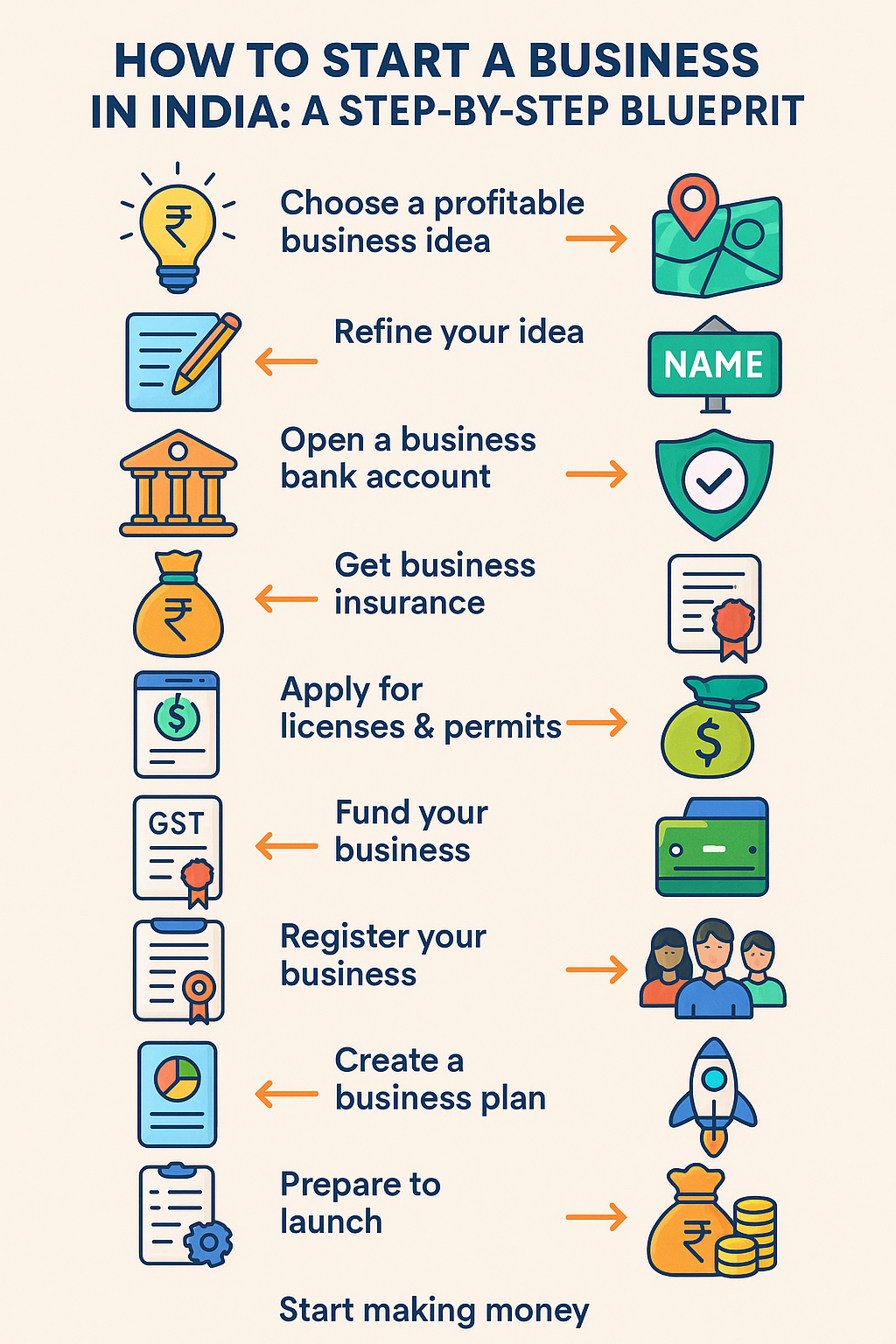How to Start a Business in India – A Step-by-Step Blueprint
India’s entrepreneurial spirit is booming. From small chai kiosks to tech unicorns, our country is home to some of the most inspiring business journeys. But starting your first business isn’t just about having a great idea — it’s about executing it systematically. This guide will walk you through how to start a business in India, following a simple blueprint tailored for first-time entrepreneurs.
Step 1: Choose a Profitable Business Idea
Every great business starts with an idea. In India, market gaps exist in diverse areas like e-commerce, food delivery, edtech, renewable energy, and local manufacturing.
Tip: Choose something that solves a real problem in your community. For example, a small-town courier service could thrive where big players haven’t reached.
Step 2: Choose the Right Location
Your location can make or break your business. A busy market area may suit a retail store, while an IT park could be perfect for a software consultancy.
Cultural Note: In India, proximity to suppliers, transportation, and customer footfall matters more than just rent cost.
Step 3: Refine Your Idea
Once you’ve chosen an idea and location, refine it. Study competitors, talk to potential customers, and tweak your offering to stand out.
Step 4: Select a Business Name
Pick a name that’s short, memorable, and legally available. In India, you can check name availability via the MCA (Ministry of Corporate Affairs) website.
Step 5: Open a Business Bank Account
For smooth transactions and accounting, open a current account in your business name. Leading Indian banks like HDFC, ICICI, and SBI offer startup-friendly accounts.
Step 6: Get Business Insurance
While many skip this step, having business insurance in India can protect you from losses due to fire, theft, or liability claims.
Step 7: Apply for Licenses & Permits
Depending on your business type, you may need:
GST Registration (if turnover exceeds ₹40 lakh for goods or ₹20 lakh for services)
FSSAI License (for food businesses)
Trade License from the local municipal authority
Udyam Registration for MSME benefits
Step 8: Fund Your Business
Options include personal savings, family contributions, bank loans, or government schemes like MUDRA Yojana and Stand-Up India.
Step 9: Register for Taxes
Apply for a PAN, TAN, and GST (if applicable). Timely registration keeps you legally compliant and avoids penalties.
Step 10: Register Your Business
Choose a suitable legal structure:
Sole Proprietorship (for small, single-owner businesses)
Partnership Firm
Private Limited Company
LLP (Limited Liability Partnership)
Step 11: Create a Business Plan
Outline your product, market, marketing strategy, and financial forecast. This will help you attract investors and stay focused.
Step 12: Build Your Team
Hire skilled and trustworthy staff. In India, networking and referrals often work better than job portals for early hires.
Step 13: Prepare to Launch
Market your business before launch using social media, local events, and word-of-mouth. In Indian markets, personal recommendations still carry huge weight.
Step 14: Start Making Money
Track your cash flow, keep good records, and adapt your strategies based on customer feedback.
Conclusion
Starting a business in India can be one of the most rewarding decisions of your life. Follow this step-by-step blueprint, stay compliant with regulations, and always keep your customers at the heart of your business.
Read more:
1.How GST Works for Small Businesses in India
2.Top 10 Government Schemes for Indian Entrepreneurs
External References:
1.MCA Services – Ministry of Corporate Affairs
2.Startup India Portal
Call to Action:
If you’re ready to take the plunge, start today! Even the largest businesses in India began with a single step — yours could be next.

